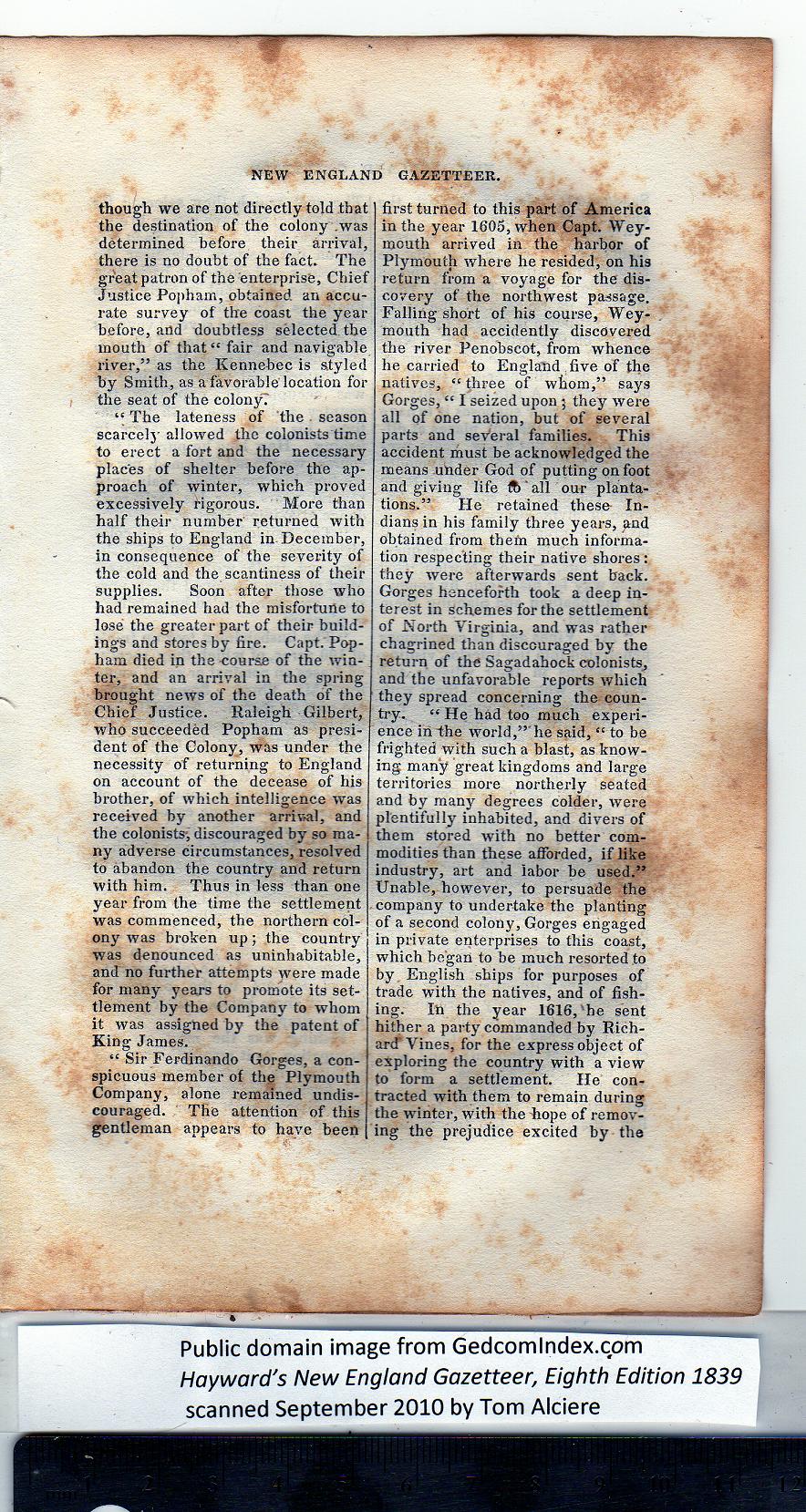|
though we are not directly told that
the destination of the colony .was
determined before their arrival,
there is no doubt of the fact. The
great patron of the enterprise, Chief
Justice Popham, obtained an accu-
rate survey of the coast the year
before, and doubtless selected the
mouth of that “ fair and navigable
river,” as the Kennebec is styled
by Smith, as a favorable location for
the seat of the colony?
“ The lateness of the season
scarcelj- allowed the colonists time
to erect a fort aDd the necessary
places of shelter before the ap-
proach of winter, which proved
excessively rigorous. More than
half their number returned with
the ships to England in December,
in consequence of the severity of
the cold and the scantiness of their
supplies. Soon after those who
had remained had the misfortune to
lose the greater part of their build-
ings and stores by fire. Capt. Pop-
ham died in the course of the win-
ter, and an arrival in the spring
brought news of the death of the
Chief Justice. Raleigh Gilbert,
who succeeded Popham as presi-
dent of the Colony, was under the
necessity of returning to England
on account of the decease of his
brother, of which intelligence was
received by another arrival, and
the colonists, discouraged by so ma-
ny adverse circumstances, resolved
to abandon the country and return
with him. Thus in less than one
year from the time the settlement
was commenced, the northern col-
ony was broken up; the country
was denounced as uninhabitable,
and no further attempts were made
for many years to promote its set-
tlement by the Company to wliom
it was assigned by the patent of
King James. |
“ Sir Ferdinando Gorges, a con-
spicuous member of the Plymouth
Company, alone remained undis-
couraged. The attention of this
gentleman appears to have been
first turned to this part of America
in the year 1605, when Capt. Wey-
mouth arrived in the harbor of
Plymouth where lie resided, on his
return from a voyage for the dis-
covery of the northwest passage.
Falling short of his course, Wey-
mouth had accidently discovered
the river Penobscot, from whence
he carried to England five of the
natives, “three of whom,” says
Gorges, “ I seized upon ; they were
all of one nation, but of several
parts and several families. This
accident must be acknowledged the
means under God of putting on foot
and giving life &' all our planta-
tions.” He retained theso In-
dians in his family three years, pnd
obtained from them much informa-
tion respecting their native shores:
they were afterwards sent back.
Gorges henceforth took a deep in-
terest in schemes for the settlement
of North Virginia, and was rather
chagrined than discouraged by the
return of the Sagadahock colonists,
and the unfavorable reports which
they spread concerning the coun-
try. “ He had too much experi-
ence in the world,”'he said, “ to be
frighted with such a blast, as know-
ing many great kingdoms and large
territories more northerly seated
and by many degrees colder, were
plentifully inhabited, and divers of
them stored with no better com-
modities than these afforded, if like
industry, art and labor be used.”
Unable, however, to persuade the
company to undertake the planting
of a second colony, Gorges engaged
in private enterprises to this coast,
which began to be much resorted to
by English ships for purposes of
trade with the natives, and of fish-
ing. In the year 1616,'he sent
hither a party commanded by Rich-
arcT Vines, for the express object of
exploring the country with a view
to form a settlement. He con-
tracted with them to remain during
the winter, with the hope of remov-
ing the prejudice excited by the |
